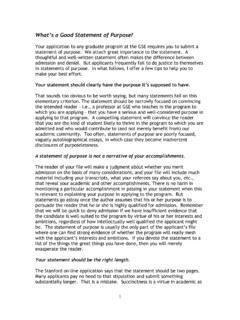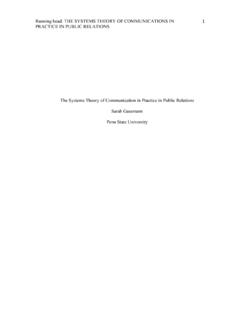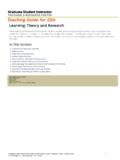Transcription of THE PSYCHOLOGY OF SELF DEFENSE: SELF AFFIRMATION …
1 THE PSYCHOLOGYOF self DEFENSE: self AFFIRMATION THEORYD avid K. ShermanGeoVrey L. CohenI. IntroductionIn major league baseball, a hitter could have a long and productive career bymaintaining a .300 average, that is, by getting a base hit 30% of the great deal of money could be earned and fame accrued. Yet the other 70%of the time, this player would have failed. The vast majority of attempts tohit the ball would result in making an out and thus pose a potential threatto the player s sense of personal worth and social major league baseball players, people in contemporary society faceinnumerable failures and self threats. These include substandard perfor-mance on the job or in class, frustrated goals or aspirations, informationchallenging the validity of long held beliefs, illness, the defeat of one s politi-cal party in an election or of one s favorite sports team in a playoV, scientificevidence suggesting that one is engaging in risky health behavior, negativefeedback at work or in school, rejection in a romantic relationship, real andperceived social slights, interpersonal and intergroup conflict, the misbehav-ior of one s child, the loss of a loved one, and so on.
2 In the course of a givenday, the potential number of events that could threaten people s moral andadaptive adequacy their sense of themselves as good, virtuous, successful,and able to control important life outcomes (Steele, 1988) seems limitlessand likely to exceed the small number of events that aYrm it. A majorundertaking for most people is to sustain self integrity when faced with theinevitable setbacks and disappointments of daily life the 70% of the time183 ADVANCES IN EXPERIMENTALC opyright 2006, Elsevier PSYCHOLOGY , VOL. 38 All rights : (06)38004-50065-2601/06 $ at bat when they do not get a base hit. How do individuals adapt to suchthreats and defend self integrity?Much research suggests that people have a psychological immune system that initiates protective adaptations when an actual or impending threat isperceived (Gilbert, Pinel, Wilson, Blumberg, & Wheatley, 1998).
3 Psychologi-cal adaptations to threats include the various cognitive strategies and evendistortions whereby people come to construe a situation in a manner thatrenders it less threatening to personal worth and well being. Many of thesepsychological adaptations can be thought of as defensive in nature, insofar asthey alter the meaning of the event in a way that shields people from theconclusion that their beliefs or actions were misguided. Psychologistshave documented a wide array of such psychological adaptations that helppeople to protect their self integrity in response to , defensive adaptations are so stubborn and pervasive that Greenwald(1980) described the ego as totalitarian in its ambition to interpret the pastand present in a way congenial to its desires and needs.
4 People view them-selves as a potent causal agent even over events that they cannot control(Langer, 1975); they view themselves as selectively responsible for producingpositive rather than negative outcomes (Greenwald, 1980; Miller & Ross,1975; Taylor, 1983). They resist change or if they do change becomemore extreme versions of what they were before (Lord, Ross, & Lepper,1979). People dismiss health information suggesting that they are at risk fordisease or should change their risky behavior (Jemmott, Ditto, & Croyle,1986; Kunda, 1987). Students may disidentify with, or downplay the person-al importance of, domains where they fail, thus sustaining self worth butprecluding the opportunity for improvement (Major, Spencer, Schmader,Wolfe, & Crocker, 1998; Steele, 1997).
5 People are overoptimistic in their pre-dictions of future success and estimations of their current knowledge andcompetence (Dunning, GriYn, Milojkovic, & Ross, 1990; Kruger & Dunning,1999). Indeed, these defensive adaptations may even benefit psychological andphysical health (Taylor & Brown, 1988). Although we suspect that people canbe more realistic and more self critical than this research suggests, and that theiroptimism and positive illusions may be magnified in certain contexts ratherthan others (see Armor & Taylor, 2002), the idea that people are ego defensiveresonates both with psychological research and lay wisdom. An importantquestion, then, concerns the circumstances under which people are less egodefensive and more open minded in their relationship with the social see defensive responses as adaptations aimed at ameliorating threatsto self integrity.
6 The vast research on defensive biases testifies to theirrobustness and to the frequency with which people use them. Although thesedefensive responses are adaptive in the sense of protecting or enhancing anindividual s sense of self integrity, they can be maladaptive to the extent theyforestall learning from important, though threatening, experiences and184 DAVID K. SHERMAN AND GEOFFREY L. COHEN information. Moreover, peoples eVorts to protect self integrity may threat-en the integrity of their relationships with others (Cohen et al., 2005;Murray, Holmes, MacDonald, & Ellsworth, 1998). Yet, these normal adap-tations can be turned oV through an altogether diVerent psychologicaladaptation to threat, an alternative adaptation that does not hinge ondistorting the threatening event to render it less significant.
7 One way thatthese defensive adaptations can be reduced, or even eliminated, is throughthe process of self aYrmation (Aronson, Cohen, & Nail, 1999; Sherman &Cohen, 2002; Steele, 1988).Steele (1988)first proposed the theory of self aYrmation. It asserts that theoverall goal of the self system is to protect an image of its self integrity, of itsmoral and adaptive adequacy. When this image of self integrity is threatened,people respond in such a way as to restore self worth. As noted previously,one way that this is accomplished is through defensive responses that directlyreduce the threat. But another way is through the aYrmation of alternativesources of self integrity. Such self aYrmations, by fulfilling the need toprotect self integrity in the face of threat, can enable people to deal withthreatening events and information without resorting to defensive this paper, we update thefield on research conducted using self aYrma-tion theory as a framework.
8 This research illuminates both the motivationalprocesses underlying self integrity maintenance and the implications ofsuch processes for many domains of PSYCHOLOGY . We illustrate how self aYrmation aVects not only people s cognitive responses to threateninginformation and events, but also their physiological adaptations and actualbehavior. The research presented has implications for psychological andphysical health, education, social conflict, closemindedness and resistanceto change, prejudice and discrimination, and a variety of other importantapplied areas. We also examine how self aYrmations reduce threats to theself at the collective level, such as when people confront threatening in-formation about their groups. We then review factors that qualify or limitthe eVectiveness of self aYrmations, including situations where aYrmationsbackfire, and lead to greater defensiveness and discrimination.
9 We discussthe connection of self aYrmation theory to other motivational theoriesof self defense and review relevant theoretical and empirical advances. Weconclude with a discussion of the implications of self aYrmation theory forinterpersonal relationships and OVERVIEW OF self AFFIRMATION THEORYSelf aYrmation theory (Aronson et al., 1999; Sherman & Cohen, 2002;Steele, 1988) begins with the premise that people are motivated to maintainthe integrity of the self . Integrity can be defined as the sense that, on theSELF AFFIRMATION THEORY185whole, one is a good and appropriate person. Cultural anthropologists usethe term appropriate to refer to behavior that isfitting or suitable giventhe cultural norms and the salient demands on people within that , the standards for what it means to be a good person vary acrosscultures, groups, and situations ( , Heine, 2005).
10 Such standards of integ-rity can include the importance of being intelligent, rational, independent,and autonomous, and exerting control over important outcomes. Suchstandards of integrity can also include the importance of being a good groupmember and of maintaining close relationships. Threats to self integrity maythus take many forms but they will always involve real and perceived failuresto meet culturally or socially significant standards (Leary & Baumeister,2000). Consequently, people are vigilant to events and information that calltheir self integrity into question, both in their own eyes and in the eyes ofothers. In such situations, people try to restore or reassert the integrity of theself. Thus, the goal of protecting self integrity, and the impact of that goalon PSYCHOLOGY and behavior, becomes apparent when integrity is are three categories of responses that people deploy to cope withsuch threats.










